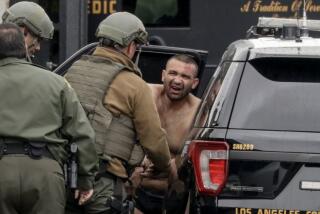Jury Deliberates 2 Hours on Penalty : Execution Urged for 2nd Killer in Verna Case
- Share via
A San Fernando Superior Court jury Monday recommended the death penalty for Raynard Cummings, the second of two men convicted of gunning down a Los Angeles motorcycle officer during a routine traffic stop in 1983.
Jurors deliberated 90 minutes on Thursday and about 30 minutes Monday morning before deciding to ask Judge Dana Senit Henry to order the execution of Cummings, 28, for murdering traffic officer Paul Verna in Lake View Terrace on June 2, 1983.
Cummings sat impassively as the jury’s recommendation was read, then smiled and chatted with his attorneys as Henry thanked the jurors for their nine months of service.
Henry has the option of rejecting the jury’s recommendation and ordering Cummings to serve life in prison without possibility of parole when she formally sentences him on Sept. 20.
A separate jury earlier this month recommended execution of Cummings’ co-defendant, 27-year-old Kenneth Gay. Gay is scheduled to appear before Henry for formal sentencing on Sept. 4.
Sentence on Other Charges
At the sentencing hearings, Henry also can order Cummings and Gay to serve as much as 25 years in state prison for additional charges stemming from a violent, six-week string of 14 robberies the two men committed just before Verna’s murder.
The two Pacoima men were convicted last month of first-degree murder with special circumstances for shooting Verna after he stopped them for running a stop sign.
According to testimony during the murder segment of the trial, Cummings fired the first shot into Verna, 35, a 1981 winner of the police Medal of Valor, before handing the gun to Gay, who got out of the car and fired the remaining five bullets into the officer.
Deputy Dist. Atty. John Watson, who prosecuted the case, asserted that the men killed Verna because they were armed ex-convicts riding in a stolen car driven by Cummings’ wife, who was not carrying a driver’s license, and that they were afraid the officer would arrest them.
Howard Price and Edward Rucker, attorneys for Cummings, argued during the murder trial that scientific evidence proved that Gay fired all the shots at Verna.
2 Juries Involved
Two juries heard the evidence against the men because Cummings pleaded guilty to the robbery charges and Gay did not. Price and Rucker persuaded Judge Henry that it would be prejudicial for jurors deciding Cummings’ fate to hear evidence about the robberies.
During the penalty phase of Cummings’ trial, Watson presented evidence in an attempt to prove that Cummings, while in custody at County Jail a year ago, hatched a plot to kill Gay and Gay’s wife, Robin, by mailing them postage stamps he believed to be laced with cyanide.
Jack Flores, an informant who was jailed with Cummings, testified that Cummings asked him to obtain poisoned stamps for the murder attempt. Instead, Flores contacted police to tell them of the plot.
Police gave Flores untainted stamps marked with an invisible dye to present to Cummings. Some of the marked stamps later were seized from Robin Gay’s jail cell after she received a letter from Cummings asking her to write and containing the stamps for her use.
‘One-Man Crime Wave’
Watson contended that Cummings is a “one-man crime wave” and “is not the proper case for sympathy or mercy or pity.”
After Monday’s death-penalty recommendation, Watson said he was “very pleased” with the verdict.
“The jury was told to weigh the aggravating against the mitigating factors and come up with a verdict,” Watson said. “They thought the evidence was overwhelming. They told me there were virtually no mitigating factors.”
Defense attorney Price told Henry after the verdict that he will move for a new trial. Death penalty cases are automatically appealed to the state Supreme Court.
‘Not Surprising’
“Given the nature of the charges and the type of evidence presented and the fact that only firm believers in the death penalty sit on a jury, it’s not surprising,” Price said of the recommendation of the death penalty.
Although most of the jurors declined to comment on the case, foreman Sam Elsner of Newhall said the other jurors asked him to make a brief statement. “I thought the jury did an excellent job,” Elsner said. “They were very, very impartial.”
More to Read
Sign up for Essential California
The most important California stories and recommendations in your inbox every morning.
You may occasionally receive promotional content from the Los Angeles Times.













